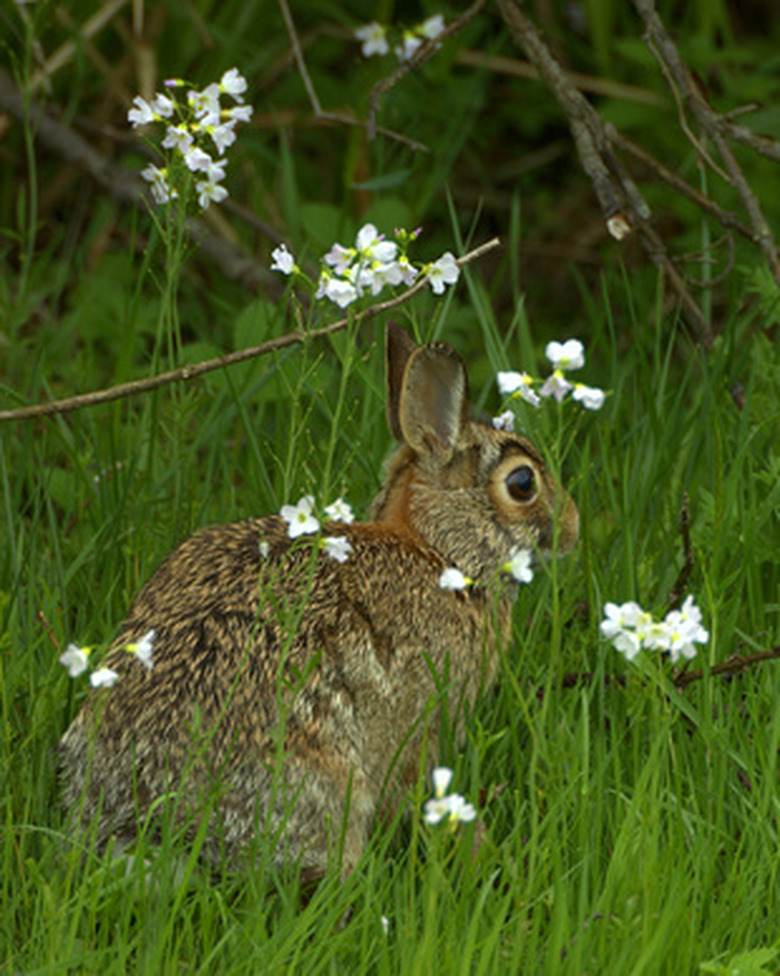Can I Spray Vegetables With Liquid Fence?
A gardener's nightmare is filled with specters of rabbits mowing down rows of lettuce and deer noshing on slender green beans. A good fence is one solution to fitful sleep, but a physical enclosure isn't always an aesthetic solution. Gardeners who go without a fence sometimes rely on smell and taste deterrents like fragrant soap, blood meal, human hair and cayenne pepper, but these provide sporadic control. Liquid Fence, a commercially available repellent that has worked to keep hungry critters from grazing on trees and shrubs, is now labeled safe for vegetables.
Contents of Liquid Fence Deer and Rabbit Repellent
Contents of Liquid Fence Deer and Rabbit Repellent
A close examination of the active ingredients in Liquid Fence Deer and Rabbit Repellent suggests that we already consume some, if not all, of the contents of this particular pesticide. Putrescent egg solids and garlic lead the list. A third ingredient, sodium lauryl sulfate, is contained in many brands of toothpaste. Finally, potassium sorbate is a common preservative in many foods.
Safe for Food Crops Label
Safe for Food Crops Label
Liquid Fence is a company that makes many products for many purposes. The only Liquid Fence products safe for edible crops are those that are specifically labeled as such. While some of the active ingredients in Liquid Fence Deer and Rabbit Repellent may appear in some of the company's other products, those products may also contain active ingredients that are toxic if used on a vegetable garden.
The Safe for Edibles Registration Process
The Safe for Edibles Registration Process
The registration and labeling process required of all pesticide manufacturers by the United States Environmental Protection Agency is lengthy and involved, and this is especially true where food crops are concerned. The companies must undertake testing that complies with strict government regulations. Government scientists evaluate the tests, after which government legal professionals finalize the approval process. In 1996, the EPA ruled that some of the ingredients–the egg solids and garlic–in Liquid Fence were safe enough to be exempt from the usual registration process. But it was not until 2010 that it was legal for Liquid Fence to label products safe for food crops.
The Consumer's Decision Regarding Safety
The Consumer's Decision Regarding Safety
Gardeners wishing to use Liquid Fence Deer and Rabbit Repellent on vegetables have the government's approval to do so, but there are other steps the consumer can take to assure complete safety. Any pesticide must be used according to directions. No matter how safe the product appears, avoid the temptation to use more than the recommended amount. Further research on a product's safety also is helpful, especially if the information comes from a reputable source, such as a university or county extension office.
References
- Liquid Fence: No More Deer or Rabbits in Your Veggie Garden!
- Liquid Fence: Deer and Rabbit Repellent
- University of Georgia: Vertebrate Pest Control
- University of Maryland: Section 25(b) Pesticides: Minimum Risk?
- University of Alabama at Birmingham: Toothpaste
- United States Environmental Protection Agency: Pesticide Registration Program
